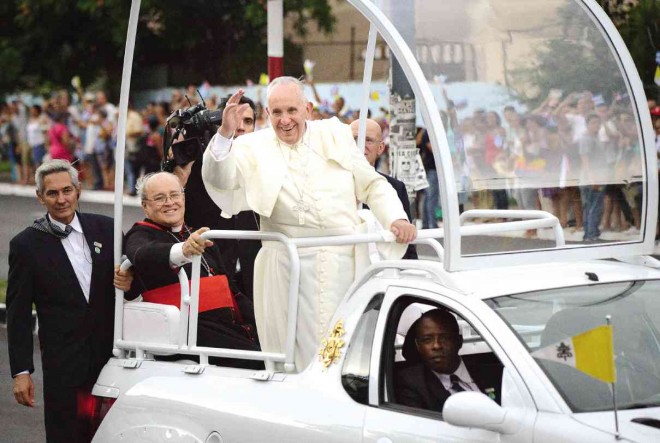Papal Mass draws hundreds of thousands

THE POPE IN HAVANA People greet Pope Francis on his popemobile as he rides from the airport to downtown Havana after his arrival in Cuba on Saturday. AP
HAVANA, Cuba—Cubans must “serve others, not be served by others,” Pope Francis said on Sunday in a Mass on Havana’s Revolution Square, urging them to reject ideology in the biggest event of his trip to the communist island.
The Pope’s homily did not directly address Cuba’s political situation or its nascent rapprochement with the United States, which he helped broker.
But he warned against personal ambition and an every-man-for-himself mentality, at a time when the communist island faces a delicate period of economic and political transition.
“Christians are constantly called to set aside their own wishes and desires, their pursuit of power, and to look instead to those who are most vulnerable,” he told hundreds of thousands of fans and faithful gathered on the iconic square.
“We need to be careful not to be tempted by another kind of service, a ‘service’ which is ‘self-serving,’” he said. “Service is never ideological, for we do not serve ideas, we serve people.”
The Pope paid tribute to Cubans as “a people with a taste for parties, for friendship, for beauty.”
“It is a people which has its wounds, like every other people, yet knows how to stand up with open arms, to keep walking in hope,” he said.
The Mass was the first on the Cuban leg of Francis’ most high-profile trip to date, which will next take him to the United States, where he will give landmark addresses to the US Congress and the UN General Assembly.
Tens of thousands of excited Cubans and foreign visitors camped out in the square overnight to see the first Latin American Pope.
Cuban President Raul Castro and Argentine President Cristina Kircher were already in the stands as Francis arrived in the square, looking smart in his papal whites and surrounded by a security detail dressed in black.
The Pope, who arrived on the communist island on Saturday, was to address the crowd beside a towering sculpture of his fellow Argentine Che Guevara’s iconic silhouette, following in the footsteps of his predecessors John Paul II and Benedict XVI.
“It’s very exciting to see Pope Francis. He’ll be the third Pope I’ve managed to see, but I’ve never been so close. We’re all hoping to receive his mercy,” said Maria Eugenia Paulina Prieto, 56, who sings in a choir that will perform during the ceremony.
US-Cuban rapprochement
The Pope’s eight-day tour follows the announcement of the US-Cuban rapprochement, which paved the way for the estranged neighbors to renew diplomatic relations in July.
Francis, who arrived in Havana on Saturday and heads to Washington on Tuesday, helped facilitate that moment in secret negotiations.
Just ahead of the Pope’s trip, the United States announced a further loosening of restrictions on business and travel with Cuba—a move that Havana’s archbishop, Cardinal Jaime Ortega, said he believed was inspired by Francis’ visit.
“It’s an extraordinary sign, and I think it’s related to this visit,” he told Vatican Radio.
After Mass, the Pope will meet with Castro, then preside over vespers at Havana Cathedral before holding an unscripted exchange with young Cubans—a demographic feeling the pain of the communist island’s difficult economic transition.
Fidel photo op?
Francis may also meet Castro’s older brother and predecessor Fidel, the 89-year-old father of Cuba’s 1959 revolution.
“If it happens, it will happen (Sunday). And we’ll get you the necessary information,” Vatican spokesperson Federico Lombardi told journalists.
Benedict XVI met Fidel when he visited the island in 2012, six years after the longtime leader handed power to Raul amid a health crisis.
On arriving Saturday, Francis asked Raul to convey his “sentiments of particular respect and consideration” to Fidel.
The Pope said in his arrival speech that Cuba was meant to be a crossroads—in pointed contrast with its long isolation by the full embargo the United States has imposed on it since 1962.
“Cuba is an archipelago, facing all directions, with an extraordinary value as a key between north and south, east and west. Its natural vocation is to be a point of encounter for all peoples to join in friendship,” he said in a speech at the airport.
He urged Castro and US President Barack Obama to build on their nascent reconciliation, saying their effort to normalize relations “fills us with hope.” He also pledged the Church’s support for the Cuban people, who face tight restrictions on their civil liberties under the communist regime and bear the weight of the economic woes that decades of isolation have wrought on the island.
While the Pope shares the Castro brothers’ radical critique of global capitalism, he has not been shy about prodding the regime toward change, including more space for the Church on an island that was an atheist state for more than three decades.
Francis, however, is not scheduled to meet with any anti-Castro dissidents on his trip.
The Pope will travel on Monday and Tuesday to the Cuban cities of Holguin and Santiago, before heading to the United States, where he will give landmark addresses to the US Congress and UN General Assembly.
On Saturday, Francis exhorted Cuba and the United States to set an example for the world by deepening the recent rapprochement that he helped secretly broker between the former Cold War foes.
His zucchetto skullcap flying off in the Caribbean breeze at the start of his tour, Francis used his arrival speech at Havana airport to praise this year’s normalization of diplomatic relations.
RELATED STORY